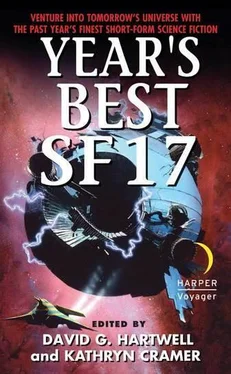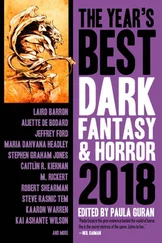They had barely left when the Protectorate fire service came roaring down the street to put out the blaze. This was not, Thorn knew, out of respect for the school or for the Waste, which could have gone up in flame wholesale for all the authorities cared; it was simply that in a domed city, a fire anywhere was a fire everywhere. Even the palaces would have to smell the smoke and clean up soot if it were not doused quickly. Setting a fire was as much a defiance of the Protectorate as of the Wasters.
Thorn watched long enough to know that the conflagration would not spread, and then walked back home. When she arrived, three women were sitting with Maya at the kitchen table. Two of them Thorn knew: Clarity and Bick, interstellar wanderers whose paths had crossed Thorn’s and Maya’s on two previous planets. The first time, they had been feckless coeds; the second time, seasoned adventurers. They were past middle age now, and had become the most sensible people Thorn had ever met. She had seen them face insurrection and exile with genial good humor and a canister of tea.
Right now their teapot was filling the kitchen with a smoky aroma, so Thorn fished a mug out of the sink to help herself. Maya said, “So what were the Incorruptibles doing?”
“Burning the school,” Thorn said in a seen-it-all-before tone. She glanced at the third visitor, a stranger. The woman had a look of timeshock that gave her away as a recent arrival in Glory to God via lightbeam from another planet. She was still suffering from the temporal whiplash of waking up ten or twenty years from the time she had last drawn breath.
“Annick, this is Thorn, Maya’s daughter,” Clarity said. She was the talkative, energetic one of the pair; Bick was the silent, steady one.
“Hi,” Thorn said. “Welcome to the site of Creation.”
“Why were they burning the school?” Annick said, clearly distressed by the idea. She had pale eyes and a soft, gentle face. Thorn made a snap judgment: Annick was not going to last long here.
“Because it’s a vector of degeneracy,” Thorn said. She had learned the phrase from Maya’s current boyfriend, Hunter.
“What has happened to this planet?” Annick said. “When I set out it was isolated, but not regressive.”
They all made sympathetic noises, because everyone at the table had experienced something similar. Lightbeam travel was as fast as the universe allowed, but even the speed of light had a limit. Planets inevitably changed during transit, not always for the better. “Waster’s luck,” Maya said fatalistically.
Clarity said, “The Incorruptibles are actually a pretty new movement. It started among the conservative academics and their students, but they have a large following now. They stand against the graft and nepotism of the Protectorate. People in the city are really fed up with being harrassed by policemen looking for bribes, and corrupt officials who make up new fees for everything. So they support a movement that promises to kick the grafters out and give them a little harsh justice. Only it’s bad news for us.”
“Why?” Annick said. “Wouldn’t an honest government benefit everyone?”
“You’d think so. But honest governments are always more intrusive. You can buy toleration and personal freedom from a corrupt government. The Protectorate leaves this Waster enclave alone because it brings them profit. If the Incorruptibles came into power, they’d have to bow to public opinion and exile us, or make us conform. The general populace is pretty isolationist. They think our sin industry is helping keep the Protectorate in power. They’re right, actually.”
“What a Devil’s bargain,” Annick said.
They all nodded. Waster life was full of irony.
“What’s Thorn going to do for schooling now?” Clarity asked Maya.
Maya clearly hadn’t thought about it. “They’ll figure something out,” she said vaguely.
Just then Thorn heard Hunter’s footsteps on the iron stairs, and she said to annoy him, “I could help Hunter.”
“Help me do what?” Hunter said as he descended into the kitchen. He was a lean and angle-faced man with square glasses and a small goatee. He always dressed in black and could not speak without sounding sarcastic. Thorn thought he was a poser.
“Help you find Gmintas, of course,” Thorn said. “That’s what you do.”
He went over to the Turkish coffee machine to brew some of the bitter, hyperstimulant liquid he was addicted to. “Why can’t you go to school?” he said.
“They burned it down.”
“Who did?”
“The Incorruptibles. Didn’t you hear them chanting?”
“I was in my office.”
He was always in his office. It was a mystery to Thorn how he was going to locate any Gminta criminals when he disdained going out and mingling with people. She had once asked Maya, “Has he ever actually caught a Gminta?” and Maya had answered, “I hope not.”
All in all, though, he was an improvement over Maya’s last boyfriend, who had absconded with every penny of savings they had. Hunter at least had money, though where it came from was a mystery.
“I could be your field agent,” Thorn said.
“You need an education, Thorn,” Clarity said.
“Yes,” Hunter agreed. “If you knew something, you might be a little less annoying.”
“People like you give education a bad name,” Thorn retorted.
“Stop being a brat, Tuppence,” Maya said.
“That’s not my name anymore!”
“If you act like a baby, I’ll call you by your baby name.”
“You always take his side.”
“You could find her a tutor,” Clarity said. She was not going to give up.
“Right,” Hunter said, sipping inky liquid from a tiny cup. “Why don’t you ask one of those old fellows who play chess in the park?”
“They’re probably all pedophiles!” Thorn said in disgust.
“On second thought, maybe it’s better to keep her ignorant,” Hunter said, heading up the stairs again.
“I’ll ask around and see who’s doing tutoring,” Clarity offered.
“Sure, okay,” Maya said noncommittally.
Thorn got up, glowering at their lack of respect for her independence and self-determination. “I am captain of my own destiny,” she announced, then made a strategic withdrawal to her room.
The next forenote Thorn came down from her room in the face-masking veil that women of Glory to God all wore, outside the Waste. When Maya saw her, she said, “Where are you going in that getup?”
“Out,” Thorn said.
In a tone diluted with real worry, Maya said, “I don’t want you going into the city, Tup.”
Thorn was icily silent till Maya said, “Sorry—Thorn. But I still don’t want you going into the city.”
“I won’t,” Thorn said.
“Then what are you wearing that veil for? It’s a symbol of bondage.”
“Bondage to God,” Thorn said loftily.
“You don’t believe in God.”
Right then Thorn decided that she would.
When she left the house and turned toward the park, the triviality of her home and family fell away like lint. After a block, she felt transformed. Putting on the veil had started as a simple act of rebellion, but out in the street it became far more. Catching her reflection in a shop window, she felt disguised in mystery. The veil intensified the imagined face it concealed, while exoticizing the eyes it revealed. She had become something shadowy, hidden. The Wasters all around her were obsessed with their own surfaces, with manipulating what they seemed to be. All depth, all that was earnest, withered in the acid of their inauthenticity. But with the veil on, Thorn had no surface, so she was immune. What lay behind the veil was negotiated, contingent, rendered deep by suggestion.
Читать дальше












